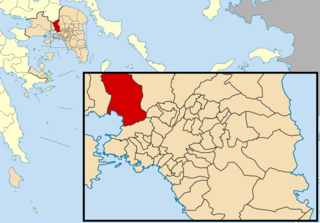Equipment
The fluid catalytic cracking is the main conversion unit, with a nominal capacity of 45,000 barrels per day (7,200 m3/d). The unit processes atmospheric residue and vacuum gas oil of the Aspropyrgos and Thessaloniki refineries, to produce higher value products.

In petrochemistry, petroleum geology and organic chemistry, cracking is the process whereby complex organic molecules such as kerogens or long-chain hydrocarbons are broken down into simpler molecules such as light hydrocarbons, by the breaking of carbon-carbon bonds in the precursors. The rate of cracking and the end products are strongly dependent on the temperature and presence of catalysts. Cracking is the breakdown of a large alkane into smaller, more useful alkenes. Simply put, hydrocarbon cracking is the process of breaking a long-chain of hydrocarbons into short ones. This process requires high temperatures and high pressure.
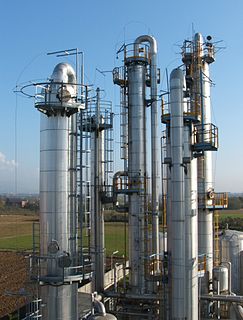
Continuous distillation, a form of distillation, is an ongoing separation in which a mixture is continuously fed into the process and separated fractions are removed continuously as output streams. Distillation is the separation or partial separation of a liquid feed mixture into components or fractions by selective boiling and condensation. The process produces at least two output fractions. These fractions include at least one volatile distillate fraction, which has boiled and been separately captured as a vapor condensed to a liquid, and practically always a bottoms fraction, which is the least volatile residue that has not been separately captured as a condensed vapor.
With the upgrade of the naphtha hydrodesulfurization and reforming units and with the operation of the TAME unit, the refinery is in a position to produce high octane gasoline with strict environmental specifications (10 ppm S) which supplies to the entire market and covers 80% of the total group production in gasoline products. With the upgrade of the diesel desulphurization unit and the distribution network, it is in a position to produce auto diesel (of 50 and 10 ppm S).
Naphtha is a flammable liquid hydrocarbon mixture.
Hydrodesulfurization (HDS) is a catalytic chemical process widely used to remove sulfur (S) from natural gas and from refined petroleum products, such as gasoline or petrol, jet fuel, kerosene, diesel fuel, and fuel oils. The purpose of removing the sulfur, and creating products such as ultra-low-sulfur diesel, is to reduce the sulfur dioxide emissions that result from using those fuels in automotive vehicles, aircraft, railroad locomotives, ships, gas or oil burning power plants, residential and industrial furnaces, and other forms of fuel combustion.

Gasoline, gas or petrol is a colorless petroleum-derived flammable liquid that is used primarily as a fuel in spark-ignited internal combustion engines. It consists mostly of organic compounds obtained by the fractional distillation of petroleum, enhanced with a variety of additives. On average, a 42-U.S.-gallon (160-liter) barrel of crude oil yields about 19 U.S. gallons of gasoline after processing in an oil refinery, though this varies based on the crude oil assay.
The Aspropyrgos refinery owns a large private harbour, has modern oil tanker and rail terminals, an extensive crude oil distribution pipeline network from Pachi – Megara, and a distribution pipeline for finished and semi-finished products from and to the Elefsina refinery. It is also connected, through a fuel pipeline, to the Eleftherios Venizelos Athens International Airport, having the main responsibility for fuel supply.

An oil tanker, also known as a petroleum tanker, is a ship designed for the bulk transport of oil or its products. There are two basic types of oil tankers: crude tankers and product tankers. Crude tankers move large quantities of unrefined crude oil from its point of extraction to refineries. For example, moving crude oil from oil wells in Nigeria to the refineries on the coast of the United States. Product tankers, generally much smaller, are designed to move refined products from refineries to points near consuming markets. For example, moving gasoline from refineries in Europe to consumer markets in Nigeria and other West African nations.

Pipeline transport is the long-distance transportation of a liquid or gas through a system of pipes—a pipeline—typically to a market area for consumption. The latest data from 2014 gives a total of slightly less than 2,175,000 miles (3,500,000 km) of pipeline in 120 countries of the world. The United States had 65%, Russia had 8%, and Canada had 3%, thus 75% of all pipeline were in these three countries.

Megara is a historic town and a municipality in West Attica, Greece. It lies in the northern section of the Isthmus of Corinth opposite the island of Salamis, which belonged to Megara in archaic times, before being taken by Athens. Megara was one of the four districts of Attica, embodied in the four mythic sons of King Pandion II, of whom Nisos was the ruler of Megara. Megara was also a trade port, its people using their ships and wealth as a way to gain leverage on armies of neighboring poleis. Megara specialized in the exportation of wool and other animal products including livestock such as horses. It possessed two harbors, Pegae, to the west on the Corinthian Gulf and Nisaea, to the east on the Saronic Gulf of the Aegean Sea.

Oil refinery or petroleum refinery is an industrial process plant where crude oil is transformed and refined into more useful products such as petroleum naphtha, gasoline, diesel fuel, asphalt base, heating oil, kerosene, liquefied petroleum gas, jet fuel and fuel oils. Petrochemicals feed stock like ethylene and propylene can also be produced directly by cracking crude oil without the need of using refined products of crude oil such as naphtha.
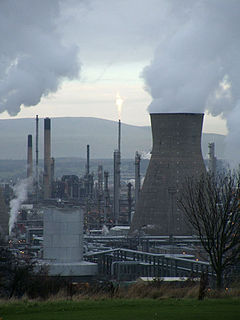
Petroleum products are materials derived from crude oil (petroleum) as it is processed in oil refineries. Unlike petrochemicals, which are a collection of well-defined usually pure chemical compounds, petroleum products are complex mixtures. The majority of petroleum is converted to petroleum products, which includes several classes of fuels.

Hellenic Petroleum S.A. is one of the largest oil companies in the Balkans and with its roots dating to 1958 with the establishment of the first oil refinery in Greece (Aspropyrgos).

Singapore Petroleum Company Limited is a Singaporean oil company. SPC is involved in the exploration and production of petroleum, refining, trading and petroleum product distribution.
Calumet Specialty Products Partners, L.P. is a public U.S.-based company which specializes in the manufacturing of high-quality specialty hydrocarbon products. Calumet produces naphthenic and paraffinic oils as well as aliphatic solvents, synthetic lubricants, asphalt, fuels, white mineral oils, waxes, petrolatums, and hydrocarbon gels. Calumet's headquarters are in Indianapolis, Indiana. The company owns several manufacturing plants in Princeton, Cotton Valley, and Shreveport, Louisiana, as well as in Burnham, Illinois, Dickinson, San Antonio, Porter and Houston, TX, Karns City, Pennsylvania, Farmingdale, New Jersey, and Great Falls, Montana. Calumet Specialty Products Partners has one of the most diverse specialty hydrocarbon capabilities in the world.

Petroleum production in Canada is a major industry which is important to the economy of North America. Canada has the third largest oil reserves in the world and is the world's fifth largest oil producer and fourth largest oil exporter. In 2015 it produced an average of 621,610 cubic metres per day (3.9 Mbbl/d) of crude oil and equivalent. Of that amount, 61% was upgraded and non-upgraded bitumen from oil sands, and the remainder light crude oil, heavy crude oil and natural-gas condensate. Most of Canadian petroleum production is exported, approximately 482,525 cubic metres per day (3 Mbbl/d) in 2015, with almost all of the exports going to the United States. Canada is by far the largest single source of oil imports to the United States, providing 43% of US crude oil imports in 2015.
OKTA was founded in 1978 and is a refinery in the Balkan area.
OKTA is part of one of the biggest groups for the refining, distribution, and trade of crude oil, oil derivatives and petrochemicals – the Hellenic Petroleum group.
Apart from its main activities, OKTA has developed its own retail network, which consists of 26 rebranded petrol stations.
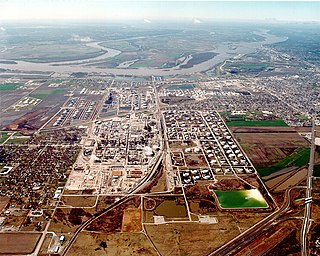
The Wood River Refinery is an oil refinery located in Roxana, Illinois, approximately 15 miles (24 km) north of St. Louis, Missouri, on the east side of the Mississippi River. The refinery is currently owned by Phillips 66 and Cenovus Energy and operated by the joint-venture company WRB Refining, LLC (WRB). WRB was formed on 1 July 2007, with Encana taking a 49% interest in Wood River and also Phillips 66's Borger refinery. Encana subsequently spun off oil sands producer Cenovus and ConocoPhillips spun off Phillips 66. In return for a 49% stake in the refinery, ConocoPhillips gained a joint interest in two Alberta oil sands (bitumen) heavy oil projects: Christina Lake (Alberta) and Foster Creek. ConocoPhillips’ interest was sold to Cenovus in May 2017, leaving Cenovus the sole owner and operator of the assets. Cenovus uses SAGD technology at those sites.

National Iranian Oil Refining and Distribution Company (NIORDC) is part of the Ministry of Petroleum of Iran. NIORDC was established on 8 March 1991 and undertook to perform all operations relating to refining and distribution of oil products.

U.S. Oil & Refining Co. is an oil refinery located in the tideflats of Tacoma, Washington.
Corinth Refinery is an oil refining complex in Greece, the largest industrial complex in the country with an annual capacity of 380,000 barrels per day (60,000 m3/d), operated by Motor Oil Hellas.
Western Refining, Inc., is a Texas-based Fortune 200 and Global 2000 crude oil refiner and marketer operating primarily in the Southwestern, North-Central and Mid-Atlantic regions of the United States. Western Refining (WNR) has been publicly traded on the New York Stock Exchange since January 2006 and is the fourth largest publicly traded independent refiner and marketer in the nation. Western Refining has been acquired by Tesoro another independent petroleum Refining and marketing corporation.

Pak-Arab Refinery (PARCO) is a fully integrated energy company of Pakistan. It engages in refining, transporting and marketing petroleum products.
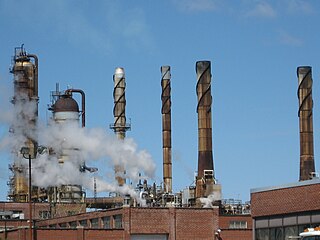
The Montreal East Refinery was an oil refinery located in Montreal East and formerly Shell Canada's largest refinery. In October 2010, refinery operations permanently ceased and the facility was subsequently converted into a storage terminal.

The Mandan Refinery is the largest oil refinery in North Dakota, partially located within the northeastern corner of the city limits of Mandan, ND just north off of Exit 153 of Interstate 94. Overall, it ranked 83rd in the country as of January 2018 with a nameplate capacity of 73,800 barrels (11,730 m3) per day. The facility is owned by Marathon Petroleum.

The Clyde Refinery was a crude oil refinery located in Clyde, New South Wales, Australia, operating between 1925 and 2013. At the time of its closure it had a refinery capacity of 85,000 barrels per day (13,500 m3/d) and was the oldest operating oil refinery in Australia. It was operated by Shell Refining (Australia) Pty Ltd and owned by the Royal Dutch Shell.

Petroleum refining processes are the chemical engineering processes and other facilities used in petroleum refineries to transform crude oil into useful products such as liquefied petroleum gas (LPG), gasoline or petrol, kerosene, jet fuel, diesel oil and fuel oils.

Thai Oil Public Company Limited or Thaioil is Thailand’s largest refinery and supplier of petroleum products. Founded in 1961, we operate one of the most efficient refineries in Asia Pacific with the current capacity of 275,000 barrels per day.

The Marathon Anacortes Refinery, prior to October 2018 known as the Andeavor Anacortes Refinery and prior to August 2017 known as the Tesoro Anacortes Refinery, is a petroleum refinery located about 70 miles north of Seattle on March Point, just outside Anacortes, Washington. The refinery has operated in Anacortes since 1955, and has 425 full-time employees. It has a 120,000 barrels per day (bpd) capacity and is operated by Marathon Petroleum.
Washington state has the fifth highest oil refining capacity of any state. As of 2018, there are 5 refineries in Washington state with a joint capacity of 637,700 b/d. They are, in order of greatest b/d capacity, Cherry Point refinery, Shell Anacortes refinery, Marathon Anacortes refinery, Ferndale refinery and U.S. Oil refinery.
